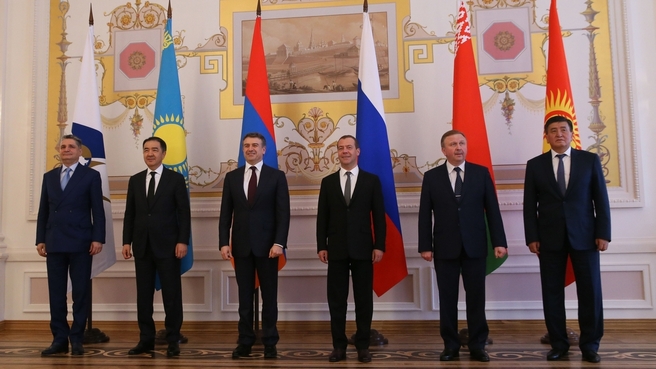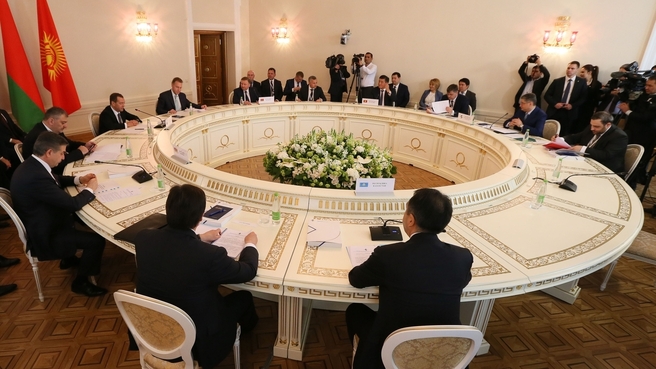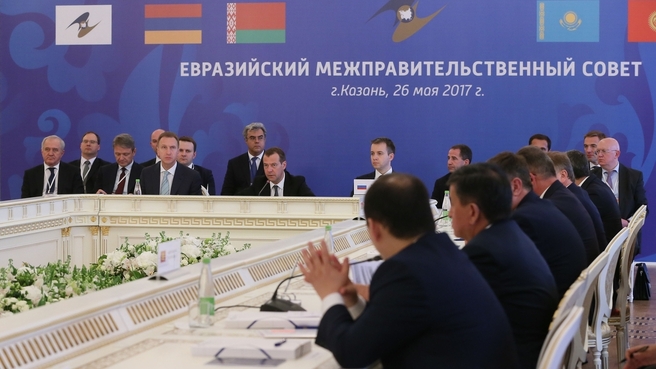Dmitry Medvedev: "All our nations benefit from participating in the Eurasian Economic Union. From January to March, mutual trade rose by about one third compared to the same period last year. Exports to third countries grew at about the same rate. This represents a $30 billion increase in absolute terms."
Dmitry Medvedev’s remarks at the meeting
Documents signed following the meeting
List of the heads of delegations participating in the Eurasian Intergovernmental Council meeting:
Group photo of the heads of delegations participating in the Eurasian Intergovernmental Council meeting
Prime Minister of the Republic of Armenia Karen Karapetyan
Prime Minister of the Republic of Belarus Andrei Kobyakov
Prime Minister of the Republic of Kazakhstan Bakytzhan Sagintayev
Prime Minister of the Kyrgyz Republic Sooronbai Jeenbekov
Prime Minister of the Russian Federation Dmitry Medvedev
Chairman of the Board of the Eurasian Economic Commission Tigran Sargsyan
Excerpts from Dmitry Medvedev’s remarks at the Eurasian Intergovernmental Council meeting:
All our nations benefit from participating in the Eurasian Economic Union regardless of any current fluctuations or difficulties. The more areas that are integrated in reality, not merely on paper, the better it will be, the more opportunities there will be for each participant to feel the effect of the common market, of joint projects, and ultimately of the union in general.
Even at a time when the world economic situation is not entirely favourable, the major socioeconomic indicators of our countries are improving. This is in part the result of our joint efforts. From January to March, mutual trade rose by about one third compared to the same period last year. Exports to third countries grew at about the same rate. This represents a $30 billion increase in absolute terms. Each of our five countries has positive trends.
A regulation took effect in May, which regulates the circulation of medicines and medical products in accordance with the common principles for all five countries.
We have managed to lift the major barriers to the flow of goods, yet the flow of services, capital and labour still faces barriers. In the coming years we have to end approximately two dozen restrictions in industry, agriculture, energy, and technical regulation.
We are interested in creating the best possible conditions for our entrepreneurs to work on the union’s unified market, in setting up administrative procedures in such a way that they do not pressurise business, so as to help our companies successfully compete with colleagues from third countries. We have to complete as soon as possible the creation within our union of the so-called “single window” for dealing with foreign trade transactions so as to gradually move on to transborder paperless trade.
All the documents that we adopt should not make conditions for business worse. This is why we launched a procedure for assessing regulatory impact, which has been fairly effective in our country and in some other countries of the inion. And last year it was used for the first time in the Eurasian Commission format.
Retrospective
-
Meeting of the Eurasian Intergovernmental Council, 16 November 2016
-
Meeting of the Eurasian Intergovernmental Council, 27 October 2016
-
Meeting of the Eurasian Intergovernmental Council, 12 August 2016
-
Meeting of the Eurasian Intergovernmental Council, 20 May 2016
-
Meeting of the Eurasian Intergovernmental Council, 13 April 2016
-
Meeting of the Eurasian Intergovernmental Council, 8 September 2015
-
Meeting of the Eurasian Intergovernmental Council, 29 May 2015
-
Meeting of the Eurasian Intergovernmental Council, 6 February 2015
Transitioning away from paperwork and toward electronic documents, online technologies in education, medicine, big data systems, the emergence of driverless transport and the so-called internet of things – these are all elements of the digital economy.
We are already taking advantage of some of these opportunities within our integrated information system in the Eurasian Economic Union. The Digital Economy national programme is currently being developed in Russia by experts and business representatives. We could organise work in the same format in our union as well in order to fill the digital agenda.
In the near term, we have to form a regulatory environment and create a technological foundation in the union for the development of digital technologies. Today we are signing corresponding documents.
Last year agricultural production across the union grew by 4 percent, in our country it is close to 5 percent. We must make more productive use of our advantages, coordinate our national agricultural policies, and use various modern technologies and innovative practices.
A well-developed competitive environment creates powerful incentives for innovations. I think it’s really important that the measures we are taking to support competitive principles in national markets be accompanied by supranational mechanisms. In fact, we have already agreed on unified rules for rendering industrial subsidies and on the voluntary coordination of such support measures for producers with partners.
Documents signed following the Eurasian Intergovernmental Council meeting:
- Eurasian Intergovernmental Council Directive on the Action Plan (Roadmap) to Eliminate Exemptions and Restrictions on the Domestic Market of the Eurasian Economic Union.
- Eurasian Intergovernmental Council Decision on Organising Joint Research and Development Work in the Agro-Industrial Complex of the Eurasian Economic Union Member States.
- Eurasian Intergovernmental Council Directive on Ensuring the Holding of National Population Censuses during the 2020 Round in the Eurasian Economic Union Member States.
- Eurasian Intergovernmental Council Directive on the Eurasian Economic Commission’s Annual Report on Monitoring the Assessment of the Regulatory Effect of the Eurasian Economic Commission’s Draft Decisions in 2016.
- Agreement on the procedure for the voluntary harmonisation of specific subsidies for industrial goods by the Eurasian Economic Union member states and the Eurasian Economic Commission and the conduct of proceedings by the Eurasian Economic Commission on the provision of specific subsidies by the Eurasian Economic Union member states.
- Eurasian Intergovernmental Council Instruction on Developing the One-Stop Shop Mechanism in Regulating Foreign Economic Activity in the Eurasian Economic Union Member States.
- Eurasian Intergovernmental Council Directive on the Time and Place of the Next Eurasian Intergovernmental Council Meeting.















